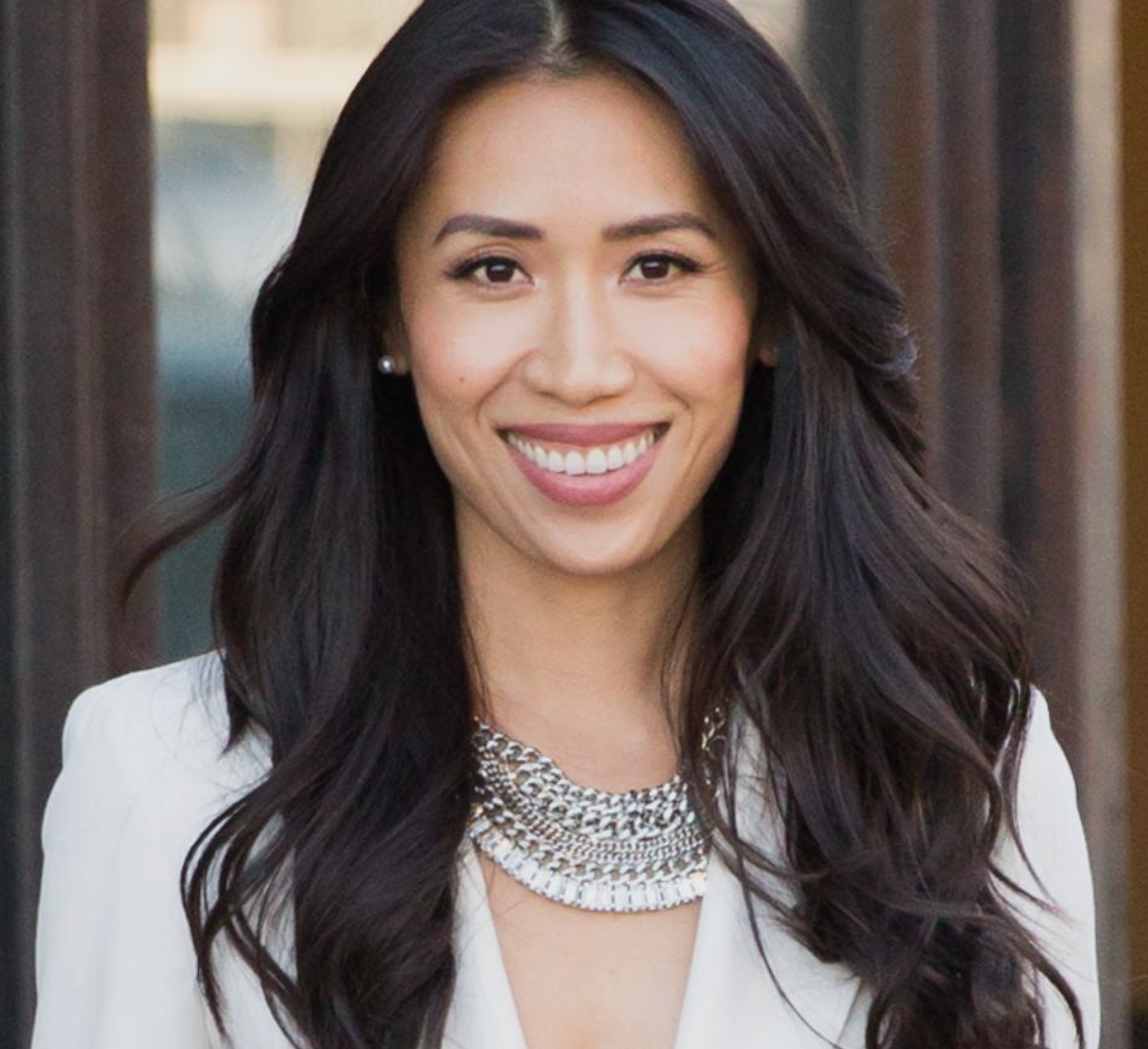Christine Chang
Christine Chang is a Photographer and Author based in Los Angeles. Christine’s work has been published in numerous magazines including People, US Weekly, and Modern Luxury.
Her authentic style has attracted celebrities such as Clint Eastwood, Pierce Brosnan, and Jane Fonda. Corporate Clients include AOL, Appirio, and Mind Valley. With over 15 years of experience, Christine also coaches aspiring photographers and creative entrepreneurs through online tutorials and workshops.
Besides photography, her most recent project has been publishing a book called "Show Up: Finding Love for Independent Women," written for capable women who feel like they excel at everything in life except love. It is based on her own frustrating experience with dating before meeting her husband.
Interview: Christine Chang, Photographer, Author
By Angela Tai
Your work has been published in numerous reputable magazines. How did you decide on photography as the career for you?
The initial decision was gut-based - photography was a hobby for a long time. My mom bought me a DSLR camera one year and I couldn’t put it down. It was a strong passion of mine so I made the decision to move to LA to pursue photography and weddings in particular. I’ve always been very drawn to and interested in relationships - I was very specific within photography; I started with headshots because you do what you have to do to make a living. I was waiting tables and many of my co-workers were actors so I took their headshots. I busted my ass for 2-3 years, I started doing low-paying gigs on Craigslist to build up my portfolio and eventually word-of-mouth started to pay off and I moved to weddings. Photographing weddings is a passion of mine and doesn’t feel like work.
How did the opportunity with People magazine come about and did that also open up other opportunities for you?
Yeah, usually when I’ve been published in any of those magazines, I let the publicists handle it. The celebrities in my portfolio definitely help my reputation; I also live in LA so you just happen to meet more of them. Where I’m originally from is very suburban so I probably wouldn’t have as much opportunity there, living in LA has really enhanced my portfolio. I see the opportunity as a plus.
How do you prepare yourself before a shoot?
Before a wedding or large event, I still get nervous. I don’t cram my schedule before a shoot - I like to make sure that I’m well-rested and feel good so I’m not nervous or stressed. This was the best piece of advice I’ve received: “Anytime you’re nervous about something, you’re making that moment more important than the moment you’re in.” This has helped me relax - doing little things like eating my breakfast and enjoying the day prior to a photography shoot helps a lot.
Congratulations on the release of your new book! In Show Up: Finding Love For Independent Women. You talk about strong and capable women who often find themselves struggling in their love lives. What message do you want to convey to boss women who might feel like they’ve excelled in many areas of their lives but resigned on others, such as finding love?
I remember how frustrated I felt when I was going through the dating process. When I was going through it, I almost felt stupid - like nobody understood how much frustration and anxiety I had. Then I had many conversations with other career-driven women who encountered the same thing, so I thought this book could be helpful for them. The one thing I would like others who are experiencing that right now is: there is nothing wrong with you. If you’re clear with what you want, good at setting your boundaries, and feel GOOD, then the process becomes really simple. It really comes down to feeling good instead of forcing a specific outcome. With love, you can’t force it, but there are specific things you can do to make possible the relationship of your dreams.
Who are some photographers that inspire you?
When I first started, Annie Leibowitz was a very big inspiration. Not so much her posed editorial work, but I found her personal work amazing because you can feel what she feels - that to me is a sign of a good artist. Joe Buissink is a wedding photographer and he was a huge inspiration for me as well. He was one of the original wedding photojournalists; the whole storytelling aspect - that was my whole goal - to be a fly on the wall. If you look at wedding blogs, you’ll see they like to publish a lot of perfectly posed photos. I understand why those shots can be appealing to look at. I’m happy that more of these blogs are starting to show candid moments because more people are craving authenticity. Before, most publications only wanted people stiffly smiling & standing at the camera which I always found boring. Some people still want that, of course. Oftentimes when I get large event gigs, they want the “pretty” magazine photos in addition to real moments, so I have assistants to help me do the polished photos while I continue to focus on the really heartfelt candid moments.
Do you feel like your style has changed throughout the years?
There are trends in photography and I have made the mistake of following some of those trends. Before Instagram came out, the professional photographers had access to those “cool” vintage filters. Now that I look back, it looks very 2007ish. Then, Instagram came out and everyone had access to those filters, and the trend died down. My style now is more natural, timeless, and classic. I want to show the truth, and I learned that if you do that, the photos will still look relevant in 20 years.
As a photographer, especially in a documentary capacity, I’m sure you encounter people who don’t want to be photographed. How do you put people at ease?
My number one method is that I always try to shoot quickly - sometimes I’ll shoot with my longer lens so I can be further away from my subject. Remembering to breathe is a big thing. The goal is to make people feel comfortable, (for booked projects) I usually start off with creating movement by saying something like “you guys hold hands and walk that way.” While you’re moving, it’s pretty hard not to be awkward. I’m big on movement and just showing up in a way where I am relaxed as well, especially if it’s their first photoshoot. I show up with calm energy; also, I make sure that I’m not nitpicking too much about things in the photo, many people start to get insecure if you’re fixing them too much. I tend to attract clients who don’t need everything to be magazine perfect. Sometimes people don’t know what they’re looking for when they’re hiring a photographer and assume whatever style they like, any photographer can deliver. In this scenario, I always make sure I set realistic expectations because I wouldn’t want my clients to be disappointed.
I’m sure you’ve had days where things are just working against you. Whether it’s lighting, weather and/or environment. How do you overcome the unforeseen elements of your job?
It’s like personal growth, you have to learn to go with the flow. Sometimes there is rain and the ceremony needs to be moved indoors. Now, with the advancement of technology, cameras are easy to learn how to use. I learned that some newer photographers don’t bother to learn how to use flash and, as a photographer, you have to be able to use flash to be in full control of a shoot. I teach photography and remind students how important it is to be able to shoot in different environments. I photographed one wedding in Santa Barbara where it was raining heavily, and the bride ended up loving a photo of them holding an umbrella in the rain - that was her favorite shot and it’s in a frame above their fireplace. For me, the important aspects are to focus on the people coming together and celebrating love. It should be a positive experience and if wedding planning starts to get stressful, take a step back and think about what you will care about after the fact.
When you look back at your accomplishments, what’s your proudest moment?
I was photographing an elopement in the Cook Islands. My dream before all of this was to be paid to travel the world and photograph these amazing destination weddings. I remember I was sitting on this little private boat jetting through a lagoon. It was just me, the couple and their event planner. Everything was perfect - the water was the most beautiful turquoise I’d ever seen. I had already been photographing destination weddings for a while, but I remember in that moment thinking to myself that I had made my dreams come true, almost as if I was a little kid version of myself. That was one of my proudest moments, and as a person who always wants to continue to grow and do new things, that’s also why I wrote my book, because I want to keep the little kid version in me alive - the kid that continues to ask, “Is she cool? Is she living life to the fullest?”
What advice would you give your younger self?
I mean, I think in general, I’d say to really do you. Do what feels true to you, I think you’ll be happier that way and produce great work. When I was younger, I cared a lot about what people thought of me which may have inhibited me from pursuing my dreams earlier. Ultimately, I would tell my younger self to ‘do you’ and not listen to anyone else’s opinion on my career trajectory.

